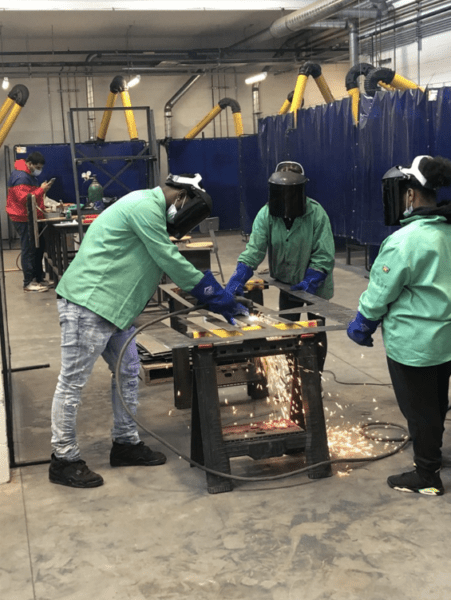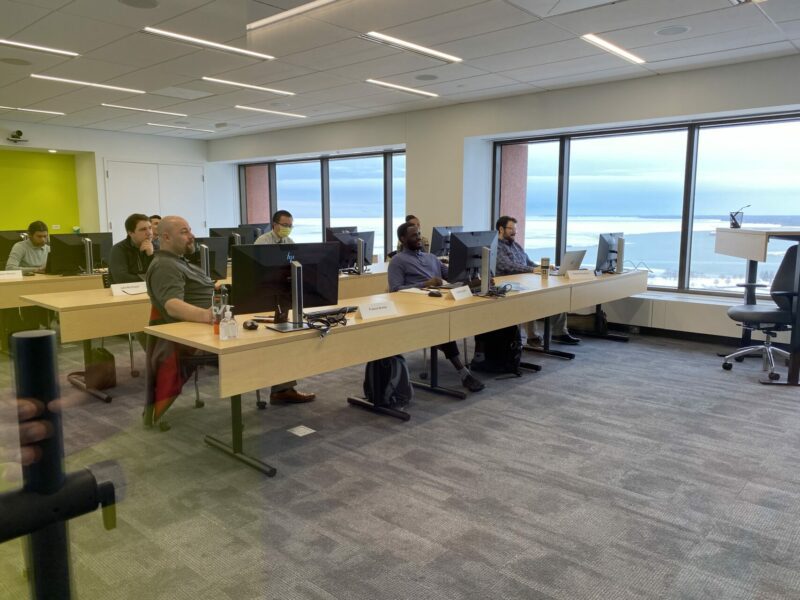Buffalo, New York, is a bucolic city known for its arts community and vast network of parks. It is also one of the largest advanced manufacturing hubs in the region, employing more than 66,000 people and generating $6.3 billion in gross regional product.
In the current talent climate, many local employers are struggling to fill in-demand tech roles through traditional talent pipelines.
“As a region, we will need to fill about 20,000 job openings in the advanced manufacturing and clean energy sectors, mainly due to retirements,” says Stephen Tucker, president and CEO of Northland Workforce Training Center. “But young people are either not aware of these jobs or they don’t have the technical skills to fill them.”
So, city and state leaders stepped in to fill the gap.
Buffalo Billion is a state grant program created to invest one billion in the local economy to spur economic development. Local training programs, including NWTC and TechBuffalo, are leveraging these resources to provide life-changing training to underserved and disadvantaged citizens throughout the community.
College degree with a kick
NWTC is an industry-driven, public-private partnership that works with local employers to train talent to fill their specific workplace needs. Applicants need only a GED to apply, and selected students receive access to free college training through partnerships with SUNY Alfred State College and SUNY Erie Community College. They can choose from a variety of one-year certificates, or a two-year associate’s degree.

But NWTC students don’t just attend college classes. The learning experience is designed to meet the unique needs of students and the employers supporting the program. “Instead of taking a reading class or a math class, students take math for machines or standard operating procedures for welders,” Tucker says. It makes every lesson relevant to the work they will eventually do.
The program also surrounds every student with a support team that includes an outreach specialist, career coaches and admissions and financial aid coordinators who help them navigate obstacles they may face during their education. Along with providing academic support, the team ensures students have access to daily transportation, childcare, rent stipends and mental health services throughout the training process. Once they complete their program, NWTC secures interviews for them with one of the partner companies.
The programs’ completion rate is currently 65 percent, which is double the national average for community colleges, and triple the local average. Tucker attributes that success to the support structure they build around their students, and the guidance they offer from recruiting through job placement. “We’re not trying to just put butts in the seats. We want them to understand what a career as an electrician or a machinist really means,” he says. “Career development theory shows people will be successful in careers that match their interests, skills and personalities.”
NWTC has seen many success stories, including Derek Frank, who completed a two-year degree after spending time in prison for dealing drugs. Frank is now employed as an electrician making $60,000 a year, and his son, age 21, has also completed the program and is now working in the field as well.
“It was the best thing that ever happened to me,” Frank says. He appreciated how the program focused on safety first allowing students to build skills using doorbell circuitry and 24-volt applications before moving to more complex and high-risk lessons. He also appreciated how involved the instructors were in his learning process. “They noticed if my grades drop and proactively offered tutoring, or help with travel or supplies,” he says. “They made it so there was no reason I couldn’t be successful.”
When Frank graduated, he landed five interviews in two weeks, and was able to choose from multiple offers. Now, he loves his job. “It’s not just the money. Everything I learned I now practice in the field,” he says. They made it so easy for me.”
Data analytics bootcamp
TechBuffalo is another innovative workforce development program that provides job-specific training in computer science, data analytics and other in-demand skills. Their goal is to create new tech talent and build an inclusive tech culture, explains Sarah Tanbakuchi, CEO and president of TechBuffalo. “Focusing on communities that have been historically underrepresented in tech careers — women, veterans, communities of color — underpins our mission.”
Like NWTC, TechBuffalo partners with local employers to understand what tech skills they need and where there are gaps in the talent pool. Then, they build training bootcamps to fill those gaps.
One of its more recent success stories is the 12-week full-time data analytics bootcamp pilot, which ran January through April of 2022. Tanbakuchi’s team developed the program in collaboration with five employers in Buffalo representing automotive, financial services, health care, advanced manufacturing and food service. “Bringing together this many employers from so many different industries was a unique model for community training,” she says. “But this skill set cuts across all industries.”

Employers agreed to bring data analytics experts and HR leadership to the table to help develop the curriculum and to create career plans once graduates were hired. “Their long-term success will depend on the hiring manager and the subject matter expert shaping policies to support retention and employee engagement,” Tanbakuchi says.
General Assembly, which was one of the supporting employers, provided the basic curriculum, then worked with SMEs from each of the companies to customize it for entry level positions in their organizations.
Next, TechBuffalo engaged community organizations across the region to recruit candidates, who, like the applicants for NWTC, only needed a GED to qualify. They received 160 applications from candidates of all ages and backgrounds. A third of the applicants were women, more than half had a family income of less than $50,000 a year and roughly 40 percent identified as non-white.
To select the final cohort, they used a behavioral assessment and a basic programming test to determine if candidates had the ambition and ability to learn the curriculum. “We wanted to be sure we had candidates who had the highest chance of success,” she says.
The pilot program had 19 participants who spent 12 weeks in the full-time program. During that time, they provided students with financial stipends supported by employers, as well as daily meals, career counseling, transportation, Wi-Fi, childcare and any other resources they needed. They also helped them build resumes and practice their interview skills. “We customized our services to the students so they could focus on learning — because if they can’t focus on learning, it reduces their ability to make it through the program,” Tanbakuchi says.
And while students aren’t guaranteed a job post-graduation, the supporting companies — and others in the community — are eager to meet with them.
At the end of the program (which all 19 passed), students delivered capstone projects in front of all of the supporting employers, then both groups selected who they wanted to interview with.
“From there, it was a whirlwind,” Tanbakuchi says.
Half the class landed jobs through those initial interviews, and several others have been hired by employers in the community who are eager to work with this new talent pool. “These students, who had no prior exposure to data analytics, are now starting jobs in one of the fastest growing fields in the world,” Tanbakuchi says. “It is very exciting.”
Time for a change
The first cohort included Namita Acharya, who was working in admissions for University at Buffalo International Education, but wanted to make a career change into a tech field where she could build a better career. She’d initially planned to take online courses on her own when she heard about TechBuffalo.
She took the application test, which involved learning basic SQL skills, and was accepted into the program. “That was exciting, because it solidified that this was something I could do,” Acharya says.
She dove into the training, and loved the added support her instructors provided, which ranged from programming tips, to helping create a personal elevator pitch and build her LinkedIn profile. “It was empowering,” she says. “It was a hundred times more valuable than doing it by myself online.”
After her capstone presentation, Acharya landed several interviews and received an offer from ACV Auctions, which was her top choice. She’s now a Data Analyst 1, which provided her with a better salary and benefits and vision for the future. “It feels like I’m on a new career path now,” she says.
Finding a partner
TechBuffalo and NWTC are proving that when employers and community learning programs collaborate, they can create new talent pools while boosting economic mobility in underserved populations.
Tucker notes that in Buffalo, there are 3,000 job openings that his students are qualified for. “The partners who support us have first access to our students, and many of them receive multiple offers before they even graduate,” he says. For companies facing constant stress in the labor market, partnering with community organizations like NWTC and TechBuffalo just makes good business sense.
This article was originally published by Chief Learning Officer, Talent Management’s sister publication.












